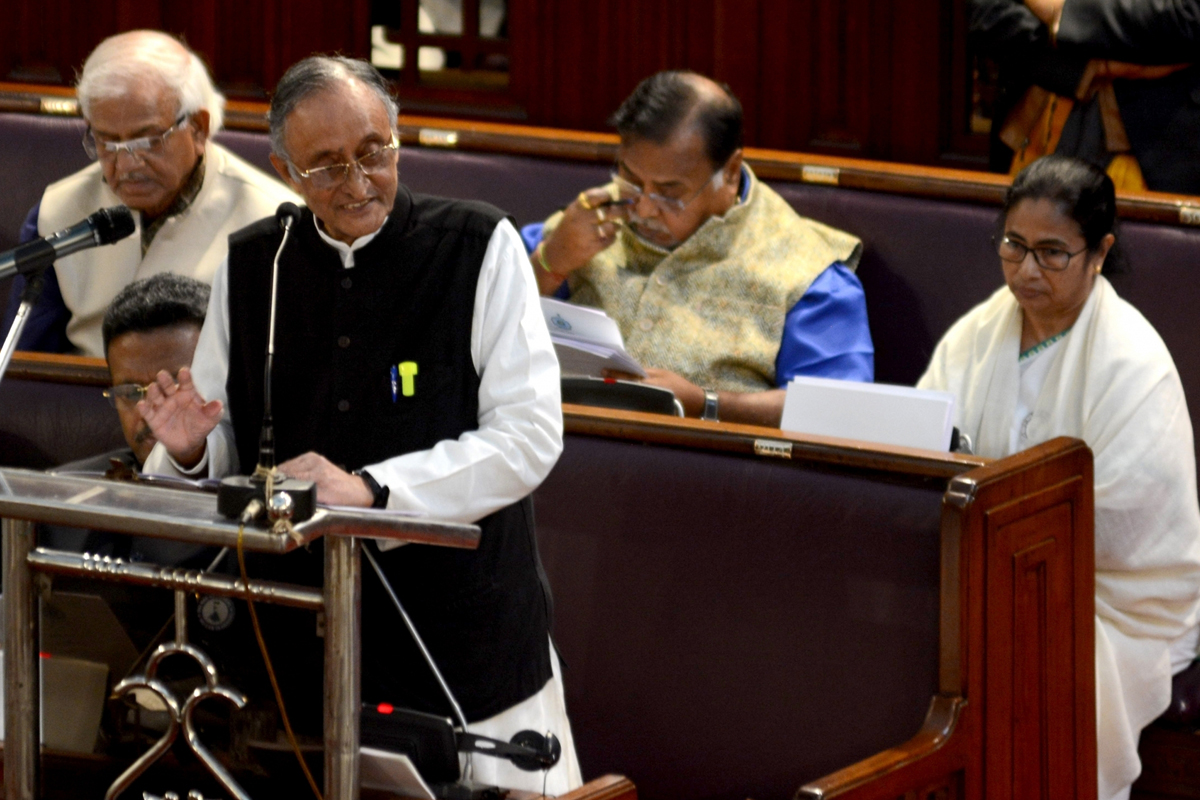A solar unmanned vehicle to monitor water pollution
Water pollution monitoring is a big challenge especially in remote areas. It will not only monitor surface water pollution but also serve many other purposes.
It thus comes about that the Rs 2,55,677- crore outlay with a small deficit of Rs 8 crore provides for a welter of schemes in the social sector for the listed classes and the almost chronically aggrieved tea garden workers, pre-eminently a pension scheme that will benefit 25 lakh people.

West Bengal Finance Minister Amit Mitra presets the State Budget 2020-21 during the Budget Session of the state assembly, in Kolkata on Feb 10, 2020. (Photo: IANS)
It might be tempting to lampoon Monday’s West Bengal budget for 2020-21 as yet another bout of electoral populism. But beyond the compulsion of next year’s Assembly elections and the panchayat/ municipal polls a few months hence must lie the wider perspective of helping the helpless subalterns. It thus comes about that the Rs 2,55,677- crore outlay with a small deficit of Rs 8 crore provides for a welter of schemes in the social sector for the listed classes and the almost chronically aggrieved tea garden workers, pre-eminently a pension scheme that will benefit 25 lakh people.
Seldom has a budget been so riveted to the Scheduled Castes and Tribes though a supplementary is inevitable ~ this budget addresses only a segment of the populace. Whether or not the schemes will be successful will hinge primarily on the execution and sector-wise allocation and also, of course, a crackdown on the intra-party bickering, decidedly endemic in rural Bengal. While the riveting interest in the social sector will be generally welcomed, the Trinamul Congress cannot be unaware that the drubbing it had suffered at the hands of the BJP in the Lok Sabha elections in the tea garden belt of north Bengal has palpably propelled a reorientation of priorities.
Likewise, the setbacks in the Junglemahal belt ~ comprising Bankura, Purulia, West Midnapore and Jhargram ~ appear to have prompted a rethink on the goalposts, which will now envisage the creation of three more universities. It was palpable last summer that rice at Rs 2 a kg or cycles for schoolgirls were only totems of pop economics that could scarcely bring about a dramatic improvement in the condition of the subaltern, who with his bow and arrow has been wallowing in the mire for as long as he has. It would be useful to recall that the Trinamul Congress had suffered a debacle in the tea garden areas, in tribal belts and Scheduled Caste-dominated parliamentary constituencies.
Advertisement
Ergo, it would be delusory to imagine that there has been an ebb in the tide of Maoism in Junglemahal. For the moment, Monday’s blueprint was only a signal of intent; neither finance minister Amit Mitra nor the Chief Minister has spelt out the praxis, howsoever beneficial. In terms of general welfare, the budget has unveiled the Hasir Alo scheme, specifically free electricity for consumers with quarterly consumption up to 75 units and a scheme to build houses for all permanent tea garden workers.
The land question for such housing projects has been left unclear. Will it be the areas vacated by the closed tea gardens? To an extent, the workers will be rehabilitated with a roof; but the alternate employment option remains to be worked out. The agricultural income tax waiver for tea gardens over the next two fiscals will benefit the beleaguered industry. The striking drawback of Mr Mitra’s effort is that there is little or no effort towards resource mobilisation. But it must be conceded it isn’t pop economics that he has attempted for even the tinkering is politically astute.
Advertisement